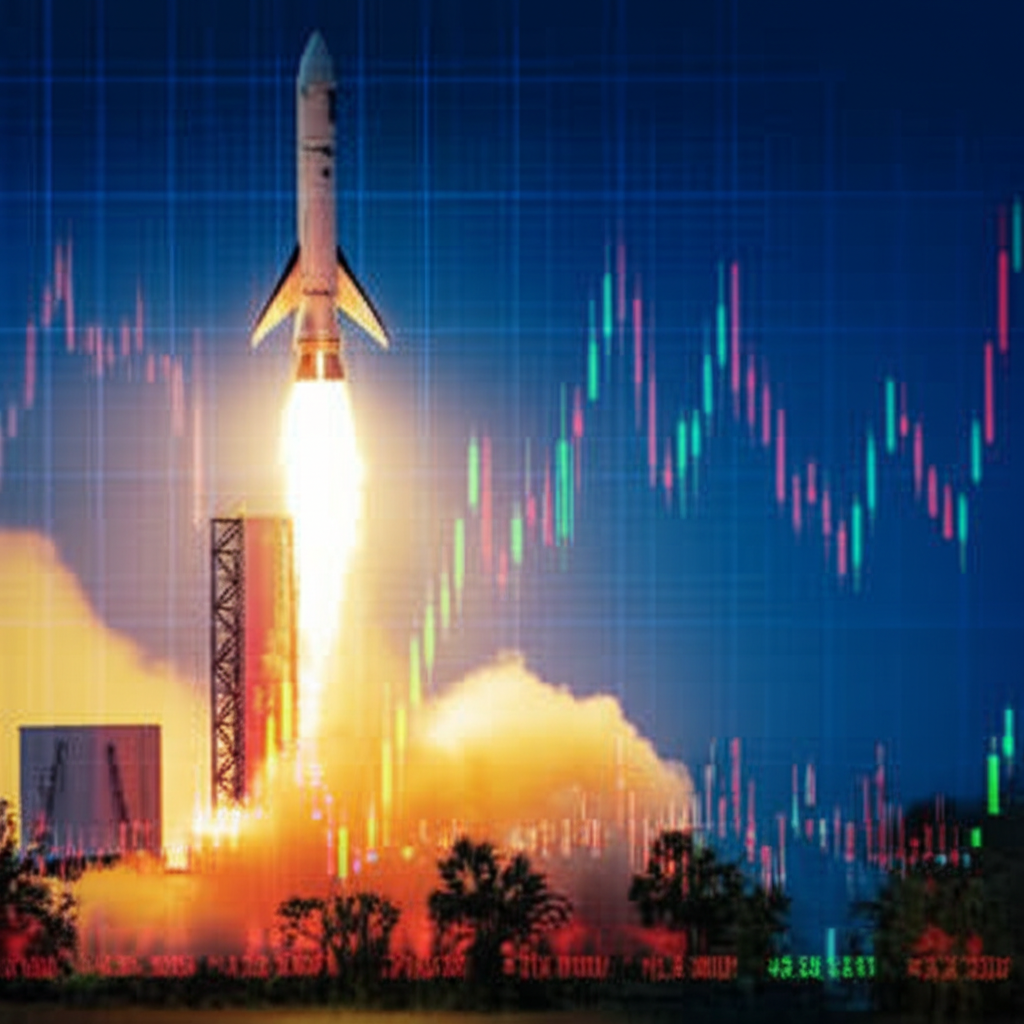Introduction: Charting the Cosmos of Space Exploration ETFs for US Investors in 2025
The final frontier is no longer reserved for astronauts and government agencies. The space economy is undergoing a commercial revolution, with private innovation accelerating progress at an unprecedented pace. From satellite internet and Earth observation to space tourism and lunar resource development, the U.S. is leading a new era of space-driven enterprise. For American investors, this shift opens up a unique opportunity: exposure to a high-growth, transformative sector through Space Exploration Exchange Traded Funds (ETFs). These funds offer diversified access to the companies building the infrastructure and technology that will define humanity’s presence beyond Earth. As we approach 2025, the momentum behind commercial space is intensifying, making now a pivotal moment to understand how these investment vehicles can align with forward-looking financial strategies.

What Are Space Exploration ETFs and Why Invest in Them in the United States?
Defining Space Exploration ETFs: Your Gateway to the Cosmos
Space Exploration ETFs are exchange-traded funds that pool investor capital to buy shares in companies directly involved in the space industry. These include firms specializing in satellite manufacturing, launch vehicle development, space-based data services, ground station operations, and even aerospace defense contractors with significant space missions. Unlike investing in a single stock-such as a rocket startup or satellite operator-space ETFs spread risk across multiple players and sub-industries. This diversification is particularly valuable in a sector still in its commercial infancy, where technological and financial hurdles remain high. For U.S. investors, these funds offer a streamlined way to participate in the broader space economy without needing to vet individual companies or predict which startups will succeed.

The Booming US Space Economy: Opportunities for 2025 and Beyond
The United States remains the global leader in space innovation, driven by a powerful combination of public investment and private-sector dynamism. NASA continues to spearhead ambitious missions like Artemis, aimed at returning humans to the Moon, while private companies such as SpaceX, Rocket Lab, and Relativity Space are transforming access to orbit with reusable rockets and rapid launch capabilities. According to the Space Foundation, the global space economy reached $546 billion in 2022, with commercial activities accounting for the majority of growth. The U.S. dominates this landscape, hosting more than half of all active satellites and the largest concentration of space-focused startups and venture capital. As satellite broadband, Earth imaging, and in-space logistics mature, the commercial space sector is expected to grow steadily through 2025 and beyond, creating long-term tailwinds for investors positioned in the right funds.
Key Benefits for United States Investment Portfolios
For American investors, adding a space-themed ETF to a diversified portfolio can provide strategic advantages:
- Diversification: Reduces reliance on any single company’s performance by spreading exposure across launch providers, satellite operators, and enabling technologies.
- Accessibility: Offers retail investors a simple way to gain access to a complex, capital-intensive industry that would otherwise require deep technical knowledge and high-risk stock picks.
- Growth Potential: The space economy is still in early expansion, with new markets-like space manufacturing and lunar mining-on the horizon. Early exposure could yield outsized returns over time.
- Professional Oversight: Fund managers conduct ongoing research and rebalancing, saving individual investors the burden of tracking rapid industry shifts.
- Future-Focused Alignment: Allows investors to support and profit from technological advancements they believe will shape the next century, from global broadband access to interplanetary exploration.
Understanding the Risks of Space Investing for US Investors
While the long-term outlook is promising, space investing comes with significant risks that must be weighed carefully:
- High Volatility: As a speculative, innovation-driven sector, space ETFs often experience sharp price swings based on launch outcomes, earnings reports, or regulatory news.
- Thematic Concentration: Even diversified funds are tied to a single theme. If space investment sentiment sours, the entire sector could decline regardless of individual company performance.
- Technology Risk: Breakthroughs in propulsion, materials, or AI can render existing business models obsolete overnight.
- Regulatory and Geopolitical Exposure: U.S. space companies operate under strict FAA and FCC regulations, and international treaties can limit commercial activities. Tensions in space policy or defense spending may also impact valuations.
- Long Path to Profitability: Many space ventures require years-or decades-of capital investment before generating consistent earnings, making near-term returns uncertain.
Top Space Exploration ETFs for US Investors in 2025: A Detailed Comparison
Several ETFs offer U.S. investors direct access to the space economy, each with distinct strategies and holdings. Understanding their differences is key to making an informed decision.
ARK Space Exploration & Innovation ETF (ARKX)
Launched by ARK Invest, led by Cathie Wood, ARKX takes a broad, innovation-centric view of space. Rather than focusing solely on rocket companies, it includes firms enabling space activities through AI, robotics, 3D printing, and even satellite-dependent services like streaming and precision agriculture.
- Focus: Orbital and suborbital aerospace, enabling technologies, and industries benefiting from space data.
- Top Holdings (as of early 2024): Trimble (TRMB), Kratos Defense & Security (KTOS), Lockheed Martin (LMT), AeroVironment (AVAV), and L3Harris (LHX).
- Performance: As an actively managed fund, ARKX’s returns depend on the fund team’s stock selection. It has seen significant volatility, with strong rallies during market optimism and steep drawdowns during tech sell-offs.
- Expense Ratio: 0.75%, in line with other actively managed thematic ETFs.
- Suitability: Best for investors with high risk tolerance who believe in disruptive innovation and are comfortable with active management and sector volatility.
Procure Space ETF (UFO)
UFO is a passively managed fund that tracks the Indxx Space & Satellite Infrastructure Index, offering a more targeted approach. It focuses on companies generating a meaningful portion of revenue from space-related operations.
- Investment Mandate: Pure-play exposure to satellite communications, launch services, and space hardware manufacturers.
- Key Holdings (as of early 2024): Maxar Technologies (MAXR), Viasat (VSAT), Iridium Communications (IRDM), Virgin Galactic (SPCE), and Eutelsat (ETL.PA).
- Performance Trends: Closely follows the overall space sector, with moderate volatility compared to broader tech funds.
- Expense Ratio: 0.75%.
- Role in Portfolio: Ideal for investors seeking a rules-based, transparent way to gain exposure to the core space industry without active manager risk.
VanEck Vectors Space & Satellite ETF (ROKT)
ROKT tracks the MVIS Global Space and Satellite Industry Index and emphasizes companies with at least 50% of their revenue tied to space and satellite operations. It includes more established aerospace and defense contractors.
- Sector Focus: Satellite manufacturing, launch infrastructure, and defense-related space systems.
- Major Constituents (as of early 2024): L3Harris Technologies (LHX), Northrop Grumman (NOC), Boeing (BA), Airbus (AIR.PA), and RTX Corporation (RTX).
- Performance Analysis: Generally less volatile than ARKX or UFO due to its weighting toward large-cap, dividend-paying defense firms.
- Expense Ratio: 0.60%, making it one of the lower-cost options in the space ETF category.
- Investor Considerations: A solid choice for conservative investors who want space exposure but prefer stability and strong balance sheets.
Other Notable Space-Related ETFs for US Investors
While ARKX, UFO, and ROKT are the primary space-specific funds, broader aerospace and defense ETFs also provide meaningful exposure:
- iShares US Aerospace & Defense ETF (ITA): Holds major players like Raytheon, Lockheed Martin, and General Dynamics-many of which have significant space contracts with the Department of Defense and NASA.
- SPDR S&P Kensho Future Security ETF (KCY): Focuses on next-gen defense tech, including AI, cybersecurity, and space-based surveillance systems.
Table: Comparative Overview of Leading Space ETFs (US, 2025 Considerations)
| Ticker | Expense Ratio | AUM (approx., as of early 2024) | Primary Investment Focus | Top 5 Holdings (Illustrative, as of early 2024) | 1-Year Performance (Illustrative, early 2024) | 3-Year Performance (Illustrative, early 2024) |
|---|---|---|---|---|---|---|
| ARKX | 0.75% | $200-300M | Actively managed, broad space innovation (orbital, suborbital, enabling tech, beneficiaries) | Trimble, Kratos Defense, Lockheed Martin, AeroVironment, L3Harris | ~-5% to +10% | ~-15% to +5% |
| UFO | 0.75% | $50-100M | Passively managed, pure-play space industry (satellites, rocketry, hardware) | Maxar Technologies, Viasat, Iridium Communications, Virgin Galactic, Eutelsat | ~+5% to +20% | ~-10% to +10% |
| ROKT | 0.60% | $50-100M | Passively managed, space & satellite industry (aerospace, defense, satellite services) | L3Harris Technologies, Northrop Grumman, Boeing, Airbus, RTX Corp | ~+10% to +25% | ~+0% to +20% |
Note: AUM and performance figures are illustrative based on early 2024 data and are subject to market fluctuations. Performance for 2025 is hypothetical; past performance is not indicative of future results.
How to Choose the Best Space ETF for Your US Portfolio in 2025
Aligning with Investment Goals & Risk Tolerance for US Investors
Your decision should start with a clear understanding of your financial goals and risk appetite. Are you building a high-growth portion of your portfolio with a 10-year horizon? ARKX may fit your strategy. Or are you looking for stable, long-term exposure with less volatility? ROKT’s emphasis on established defense and aerospace firms could be more appropriate. UFO sits in the middle, offering pure-play access with passive management. Consider how much portfolio allocation you’re comfortable assigning to a high-risk, high-reward theme like space.
Analyzing Expense Ratios & Fees: Maximizing Returns for United States Portfolios
Expense ratios directly impact your net returns. While space ETFs aren’t typically low-cost-due to their niche focus-ROKT’s 0.60% fee gives it a slight edge over ARKX and UFO at 0.75%. Over time, that 0.15% difference can compound, especially in a sector where gains may be gradual. Always compare fees among similar funds, and prioritize lower costs when investment strategies are otherwise comparable.
Diversification and Underlying Holdings: What’s in the Rocket?
Don’t just look at the fund name-review the actual holdings. ARKX includes companies like Trimble, which uses satellite data for agriculture and construction, but isn’t a space company per se. UFO and ROKT are more focused on direct space operations. Evaluate whether the fund’s definition of “space” matches your expectations. A well-diversified space ETF should include a mix of launch providers, satellite operators, technology enablers, and infrastructure players to reduce reliance on any single sub-sector.
Liquidity & Trading Volume: Ensuring Smooth Transactions in the US Market
Liquidity ensures you can buy or sell shares without wide bid-ask spreads. ARKX, with higher assets under management, tends to have stronger daily trading volume, making it easier to trade at fair prices. UFO and ROKT, while accessible, have lower average volume, which could affect execution during volatile market periods. Check liquidity metrics on platforms like Nasdaq or your brokerage before investing.
Active vs. Passive Management in Space ETFs: Which Strategy Suits You?
- Actively Managed ETFs: Rely on a fund manager’s expertise to pick winners and adjust holdings. ARKX is a prime example. This approach can outperform in fast-moving sectors but carries higher fees and the risk of misjudgment.
- Passively Managed ETFs: Track an index and aim to mirror its performance. UFO and ROKT fall into this category. They offer transparency, lower costs, and consistent exposure, though they won’t beat the index.
Your choice depends on whether you trust active managers to navigate the complexities of space innovation or prefer the predictability of passive indexing.
The Future of Space Exploration: What United States Investors Can Expect Beyond 2025
The next decade will likely redefine what’s possible in space. Projects like SpaceX’s Starship aim to cut launch costs dramatically, enabling large-scale missions to Mars. NASA’s Artemis program is laying the groundwork for a sustained human presence on the Moon, potentially unlocking lunar mining and research outposts. Meanwhile, companies are exploring in-space manufacturing-producing materials in microgravity that can’t be made on Earth-and developing nuclear propulsion systems for faster deep-space travel.
The U.S. government continues to play a pivotal role. The Space Force monitors orbital activity and safeguards national assets, while the FAA regulates commercial launches and ensures safety. Federal contracts remain a critical revenue stream for space companies, especially in defense and satellite intelligence. As these sub-sectors mature, new investment vehicles-such as space infrastructure funds or venture-focused ETFs-may emerge, giving U.S. investors more nuanced ways to participate. The long-term vision is clear: space is becoming an economic domain, not just a scientific one.
Navigating US Brokerage Platforms for Space Exploration Investments in 2025
Traditional US Brokerages for Direct ETF Investment
To invest in U.S.-listed space ETFs like ARKX, UFO, or ROKT, traditional brokerage accounts are the standard route. These platforms are regulated by the SEC and FINRA, offering security, transparency, and ease of use. Leading options include:
- Fidelity: Offers extensive research tools, no-fee ETF trades, and robust customer support.
- Charles Schwab: Provides commission-free trading on ETFs and a user-friendly interface for both new and experienced investors.
- Vanguard: Known for low-cost index funds, though it doesn’t offer a dedicated space ETF, investors can access third-party space funds.
- E*TRADE: Delivers strong trading platforms, educational resources, and mobile accessibility.
- Interactive Brokers: Ideal for active traders seeking global market access and low fees.
These platforms support long-term investing and are ideal for holding space ETFs as part of a diversified retirement or growth portfolio.
Exploring Complementary Avenues: Top Forex/CFD Brokers for Diversified Trading in 2025
While traditional brokerages handle direct ETF purchases, some U.S. investors may use forex and CFD platforms to complement their strategies-especially those interested in speculative trading or global market exposure. These platforms allow trading on price movements without owning the underlying asset, which can be useful for short-term positioning.
1. Moneta Markets:
Moneta Markets provides a powerful trading environment with competitive pricing across forex, commodities, and indices. It supports advanced order types and offers access to CFDs on individual equities, including space-related stocks where available. Regulated by the UK’s Financial Conduct Authority (FCA), Moneta Markets operates under strict compliance standards, offering U.S. traders a reliable option for diversified trading strategies. Learn more about Moneta Markets.
2. IG:
IG is a globally trusted broker with a strong U.S. presence, offering CFDs and forex trading on a wide range of instruments. Its platform includes advanced charting, real-time data, and educational content, making it suitable for both beginners and experienced traders. For investors looking to hedge or speculate on space sector volatility, IG provides flexible tools. Explore IG’s offerings.
3. OANDA:
OANDA is a well-established U.S.-based broker known for transparent pricing, innovative trading platforms, and in-depth market analysis. It caters to traders who value technological sophistication and data-driven decision-making. While primarily focused on forex, OANDA also supports CFD trading, allowing for broader portfolio diversification. Visit OANDA’s US site.
Important Note: U.S. regulations limit retail access to CFDs. Most U.S. clients on these platforms trade forex and other permitted instruments. Direct purchases of U.S.-listed Space Exploration ETFs should be made through traditional equity brokerage accounts.
Conclusion: Launching Your Space Investment Journey in 2025
Space Exploration ETFs represent a rare chance for U.S. investors to back a sector at the intersection of science, technology, and economic transformation. With commercial space activity accelerating and government support remaining strong, the foundation for long-term growth is being built. While volatility and uncertainty are inherent, the potential rewards justify careful consideration. By evaluating fund strategies, expense ratios, holdings, and liquidity, investors can choose the ETF that best fits their goals. Whether through traditional brokerages for long-term holds or complementary platforms like Moneta Markets for broader trading strategies, the tools are available. As humanity expands its presence beyond Earth, those who invest wisely today may find themselves part of a historic financial and technological journey.
Frequently Asked Questions (FAQs) About Space Exploration ETFs for US Investors
Are Space Exploration ETFs a good investment for long-term growth in the United States?
For US investors with a long-term horizon and a higher risk tolerance, Space Exploration ETFs can be a compelling investment. The sector is in its early stages of growth, driven by significant technological advancements and increasing commercialization. While volatile, the potential for substantial long-term returns is high as the space economy matures and new sub-sectors emerge.
What are the key differences between actively managed and passively managed Space ETFs available to US investors?
Actively managed Space ETFs, like ARKX, have fund managers who make discretionary decisions about holdings, aiming to outperform the market but typically with higher fees. Passively managed ETFs, such as UFO and ROKT, track a specific index, offering broad market exposure to the sector with generally lower expense ratios. Your choice depends on whether you believe active management can add value or if you prefer a lower-cost, index-tracking approach.
How can US investors buy Space Exploration ETFs in 2025, and what platforms are recommended?
US investors can purchase Space Exploration ETFs through traditional equity brokerage accounts like Fidelity, Charles Schwab, Vanguard, E*TRADE, or Interactive Brokers. These platforms offer direct access to US-listed ETFs and are fully regulated. For those interested in complementing their ETF holdings with diversified trading strategies, including forex or CFDs on related individual stocks, platforms like Moneta Markets, IG, or OANDA can provide additional avenues for broader market exposure.
What are the typical fees and expense ratios associated with Space ETFs for United States portfolios?
Space ETFs generally have higher expense ratios compared to broad market index funds due to their specialized nature and the niche sector they cover. Expense ratios typically range from 0.60% to 0.75% annually. It’s crucial for US investors to compare these fees as they can impact long-term returns, with lower ratios being more favorable.
Which specific companies are commonly held within top Space Exploration ETFs like ARKX or UFO?
Top Space Exploration ETFs hold a variety of companies. ARKX often includes innovators like Trimble and Kratos Defense, along with aerospace giants like Lockheed Martin. UFO typically features pure-play space companies such as Maxar Technologies, Viasat, and Iridium Communications. ROKT tends to include larger aerospace and defense contractors like L3Harris Technologies and Northrop Grumman. Holdings are subject to change based on the fund’s strategy and market conditions.
Is there a Vanguard Space ETF available for US investors, or are there similar alternatives to consider?
As of early 2024, Vanguard does not offer a dedicated “Space Exploration ETF.” Vanguard is known for its broad-market, low-cost index funds and ETFs. However, US investors can consider existing pure-play space ETFs like ARKX, UFO, or ROKT, or look into broader aerospace and defense ETFs (e.g., ITA) that may have significant exposure to the space sector as alternatives.
What are the primary risks associated with investing in the space sector for United States investors?
Key risks for US investors in the space sector include high market volatility due to its nascent stage, concentration risk within a specific thematic sector, rapid technological obsolescence, and the significant influence of regulatory and geopolitical factors on US space companies. Investors should be prepared for potential capital expenditure requirements and a longer timeline for profitability for many ventures.
How does the ARKX ETF compare to other leading space exploration funds like UFO or ROKT for US market exposure?
ARKX is an actively managed ETF with a broader definition of space exploration, including enabling technologies and beneficiaries, making it more diverse but also potentially more volatile. UFO is a passively managed, pure-play space ETF focusing on companies generating significant revenue directly from space. ROKT, also passively managed, concentrates on space and satellite industries, often including larger aerospace and defense contractors. For US investors, the choice depends on their preference for active vs. passive management, risk tolerance, and the specific sub-sectors of the space economy they wish to prioritize. For those looking to manage their overall portfolio and potentially trade related instruments, using a diversified broker like Moneta Markets alongside traditional ETF platforms can offer enhanced flexibility.



No responses yet